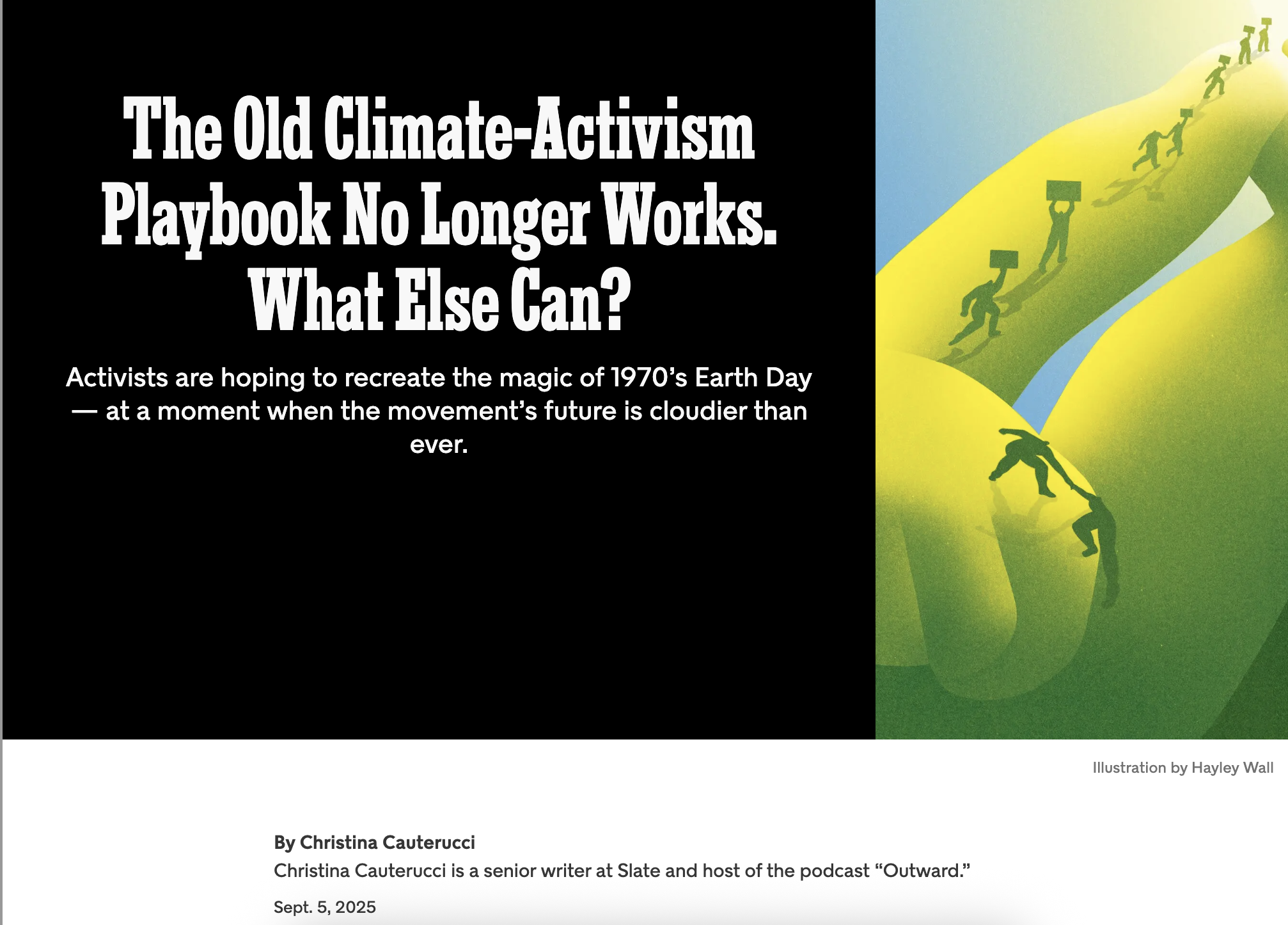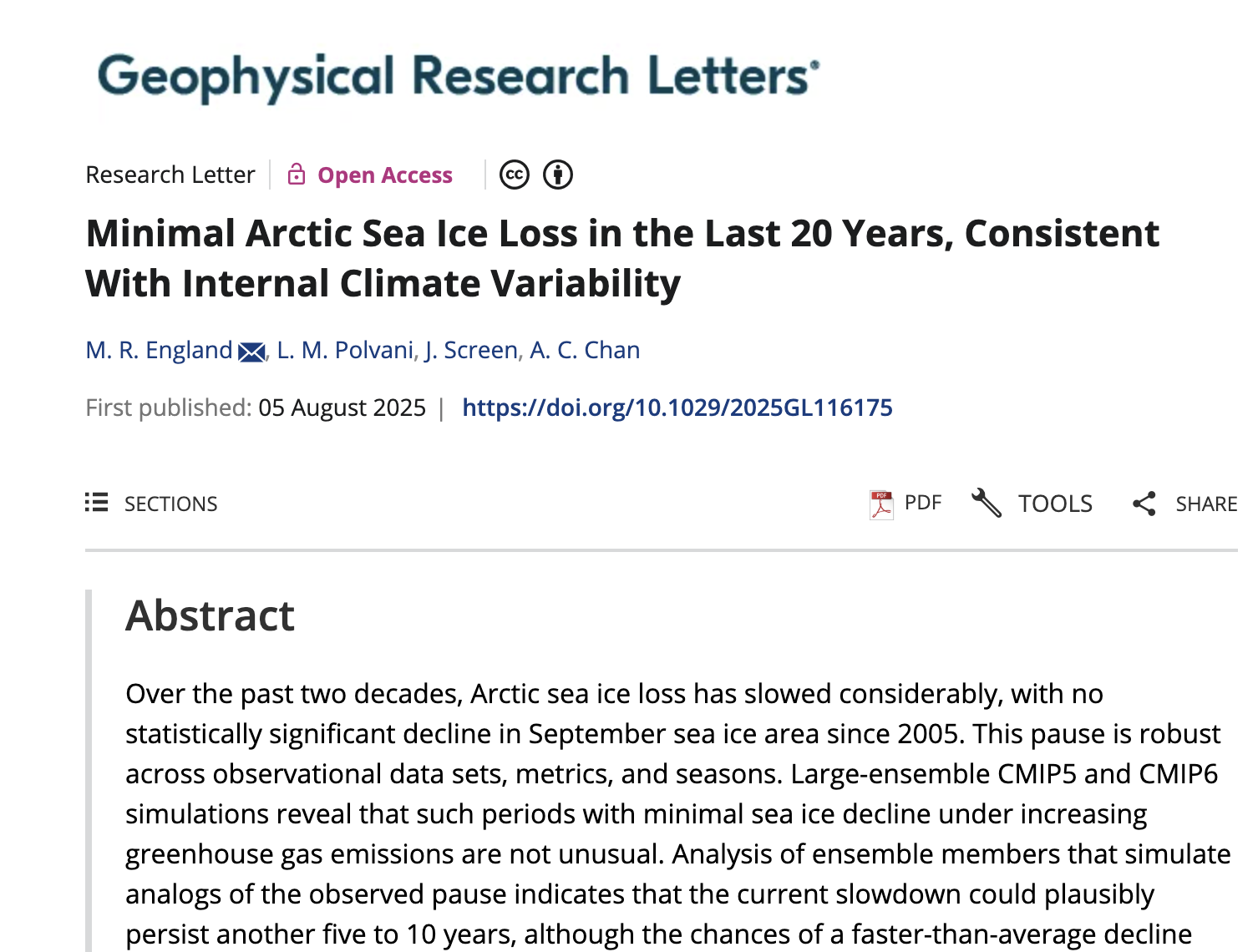Weepy Bill McKibben Strives for Relevance
By Charles Rotter
Bill McKibben has always been the climate movement’s most reliable prophet of doom, though never a particularly cheerful one. From his 1989 bestseller The End of Nature to his endless speeches about looming catastrophe, he has made a career out of telling Americans to stop enjoying themselves.
Here’s some backstory on Weepy Bill
Now, in 2025, the New York Times has generously profiled him again, portraying him not as the triumphant leader of a mass uprising, but as a weary relic of a fading movement, sipping tea on his porch in Vermont and gesturing toward solar panels like holy relics of a religion whose congregation has stopped showing up.
The article begins with a pastoral scene that would make Thoreau blush:
“At the end of a long dirt road through Vermont’s Green Mountains, Bill McKibben sat on his screened-in porch, surrounded by birdsong and the drone of buzzing insects. The July sun beat through a canopy of trees. McKibben sipped a cup of green tea and pointed outside, to the ground just past the edge of the house, where an array of solar panels tilted toward the late-morning sky. The roof, too, was loaded with panels of different vintages. ‘I’ve been putting them up at intervals for a quarter century,’ he said.”
It reads less like the description of a serious policy thinker and more like the diary entry of a man who believes his household gadgets are a model for saving civilization. That might be fine if the story didn’t pivot immediately into a tale of despair: a broken climate movement, collapsing strategies, and activists admitting their decades of work have amounted to almost nothing.
Few activists have been around longer than McKibben. As the Times recalls:
“In 1989, at age 27, he published The End of Nature, often described as the first book on global warming for lay readers, which became an international best seller. Then he turned to activism, eventually shifting his focus from combating the ‘greenhouse effect’ to organizing pipeline protests and fossil fuel divestment campaigns. Over the decades, he has evolved from a concerned observer to an elder statesman of the climate movement.”
And yet this elder statesman is reduced now to spearheading what can only be described as a nostalgia festival. On September 21, he will launch “Sun Day,” a national day of action featuring “electric-car shows, open houses at all-electric solar homes and solar installation tours”. The idea is to recreate the spirit of the first Earth Day in 1970, with McKibben describing it in terms better suited to a church potluck than a revolutionary movement:
“‘Like Earth Day, Sun Day is meant to be a giant potluck supper for activists around the country: We’ve set the date and the theme, and everyone’s bringing their own dish to the floor.’”
Apparently the climate apocalypse has been postponed long enough for activists to whip up a casserole.
The absurdity becomes even clearer when we consider the shifting rhetoric. For years, McKibben told Americans that only radical sacrifice — shutting down pipelines, grounding airplanes, giving up “lifestyle options” — could avert planetary doom. Now he insists renewables are not “the Whole Foods of energy” but “the Costco”, as if branding solar panels as cheap bulk goods will suddenly inspire a mass movement. This is less activism than late-night infomercial salesmanship.
The problem, as even his allies admit, is that none of this is working. Public opinion surveys show climate consistently ranks at the bottom of issues that influence votes. As one veteran of the first Earth Day, Denis Hayes, bluntly admitted:
“‘You can make a pretty decent case that everything that I’ve worked on in my entire professional life has gone down the toilet in the last six months.’”
Varshini Prakash of the Sunrise Movement, once hailed as the rising star of youth activism, has also lost faith:
“‘I think that window has closed, and perhaps it never really existed.’”
When your own movement leaders confess the entire project was futile, you know the game is up.
McKibben, however, plows forward with a kind of comic determination. He explains that Sun Day was originally going to be called “Sky Day,” but the marketing team couldn’t make it work:
“‘It just became clear to me that you can’t really draw a picture of the sky.’”
This is what passes for strategic insight at the highest level of climate activism — an awareness that drawing the sky is difficult. He adds, with his usual apocalyptic flair, “We’ve managed to screw up our relationship with the sun”, as though civilization were in therapy with a celestial object 93 million miles away.
Even the sympathetic observers quoted by the Times sound exasperated. Dana R. Fisher, a sociologist who studies activism, warns that Sun Day is “tone deaf, and maybe a little naïve” and predicts it could “backfire, because some people are going to celebrate these little individual actions that have no real effect … and everybody else is going to just laugh at these attempts to shine light on these small glimmers of hope in despair”.
Ted Nordhaus of the Breakthrough Institute goes further, calling Sun Day “a nostalgia for the old environmental politics that’s just dead”. In other words, McKibben is stuck trying to resuscitate a corpse.
The Times reporter, perhaps unintentionally, captures the pitiful image perfectly. At one point, McKibben reflects on the loss of cold Vermont winters while staring sadly at a puddle of melted ice cream on his pants:
“He looked down at his lap, where a chocolaty puddle was forming on his pants.”
If you wanted a single metaphor for climate activism in 2025, you could hardly do better: melted ice cream, sticky pants, and no solution in sight.
Meanwhile, the wider movement has fractured. Younger activists have turned their attention to wars and social-justice causes, abandoning weekly climate strikes. Others push ever more radical demands, from global wealth redistribution to “Make Polluters Pay” lawsuits. The only common thread is despair. McKibben himself admits he’s “always happy to be called naïve”, which may be the truest statement he’s ever made.
The New York Times tries to cast all this as a noble struggle, but the reality is that McKibben’s relevance is evaporating. His potluck activism and half-baked rebranding exercises are unlikely to inspire anyone beyond the aging choir of professional protesters. The world has moved on. Energy markets, consumer choices, and political priorities have changed, and no amount of ukulele strumming at Sun Day is going to reverse that.
What remains is McKibben himself — a man who has spent his life warning of imminent catastrophe, only to end up hawking a nostalgia festival and muttering about maple trees. The Times inadvertently reveals the truth: the climate movement is not on the verge of triumph but collapse. Its strategies have failed, its leaders are disillusioned, and its most famous prophet is left to organize solar-powered block parties while the world shrugs.
In the end, “Weepy Bill” is less a revolutionary than a relic. His Sun Day will come and go, leaving behind a few doodles of yellow circles, some speeches no one remembers, and the faint sound of melting ice cream dripping onto his khakis. If this is the best climate activism has to offer in 2025, then the obituary has already been written. The only question left is how long McKibben will keep pretending otherwise.
Despite decades of propaganda, the New York Times Magazine admits climate skeptics have won in, “The Old Climate Activism Playbook No Longer Works, What Else Can?”. Here’s an ironic quote:
“Accordingly, many politicians and corporate leaders in the U.S. and beyond have pivoted… pic.twitter.com/q5il9LYpdX
— Steve Milloy (@JunkScience) September 5, 2025





